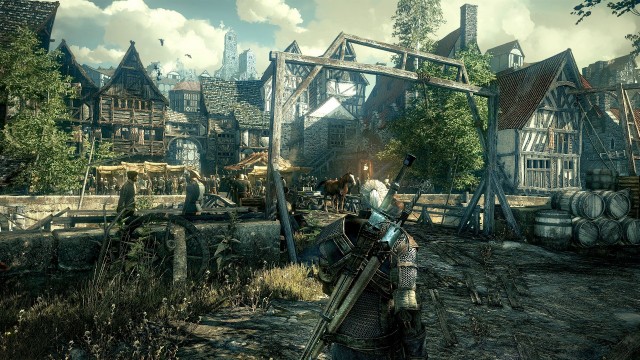
Despite not being as prolific or revered as Lord of the Rings or A Song of Ice and Fire, Andrzej Sapkowski’s Witcher novels have maintained a significant following in Europe since the early 1990s. Thanks to developer CD Projekt Red, The Witcher has begun to rise in popularity in the past decade, and with the release of the third game in the series, Wild Hunt, its ever-expanding audience continues to grow. Thanks to a healthy mix of BioWare’s conversation choices and Bethesda’s open-world sensibilities, The Witcher games have always managed to feel both familiar and distinct. Thankfully, Wild Hunt upholds this tradition.
The Witcher 3 continues the adventures of Geralt of Rivia, a Witcher on a mission to find his adopted daughter, Ciri, before a ghoulish band of fiends known as the Wild Hunt gets to her. Geralt encounters many new and familiar faces during his adventure, both friend and foe, each with a unique perspective on Geralt, his mission and the goings-on of the politically-charged world they find themselves in. Wild Hunt’s story is a relatively simple one when boiling it down to its core, but what makes it stand out is how it is presented. It’s a brutal world full of characters whose true intentions are never clear and choices which are never black and white.
Despite how unforgiving this world is, it only helps better highlight the characters that inhabit it and their memorable characteristics. Many do what they can to fit into this world and survive, presenting you with plenty who appear tough on the outside, yet struggle with their own demons and aren’t all what they seem. One character you meet early on, The Bloody Baron, fits this description perfectly. His particular story leads you down a path few games would even dare touch, leading to moments which are both shocking and heartbreaking.
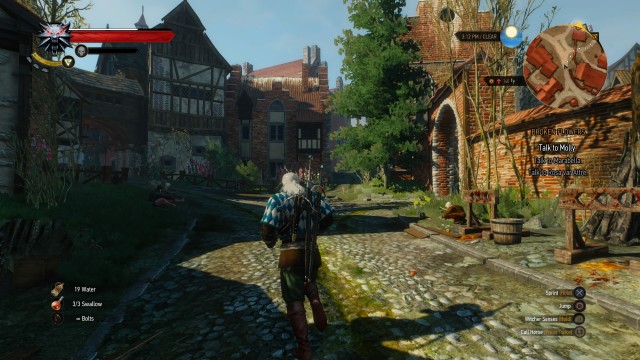
I eventually learned to sympathize with this man and his woes, despite the awful circumstances he found himself in and his history of being a generally terrible person. This is a character who might have never become more than an unsympathetic brute in most fantasy stories, yet is allowed to shine here, giving you perspective on how the world can break apart even the strongest people and mold them into something new. It turns what could have been a lazy, stereotypical character into one you’ll never forget.
The background information on the world, its inhabitants and the ongoing war between two nations which offers the backdrop for the rest of the game’s events will overwhelm new players. Even as a series veteran, even I felt slightly taken aback by The Witcher 3’s attention to detail. Thankfully, these events are mere background noise when compared to Geralt’s quest and the adventures of the bizarre characters that surround him. Like Geralt himself, you’ll never find it necessary to get involved in politics, yet you may find yourself dipping your toe in from time to time the more you play.
You don’t need to fully understand the world to follow the story, but you will quickly grow to appreciate CD Projekt Red’s attention to detail. The world simply feels lived in, as if it existed long before you wandered into it. From the largest city to the smallest towns, every facet of the world has a story to tell. If you consider yourself at all someone who finds themselves easily invested in a game’s lore, don’t be surprised if you spend hours upon hours exploring every inch of the world reading every available in-game text you can findn. None of this will be new to anyone who has experience with series like The Elder Scrolls, but nearly every aspect The Witcher 3 is lovingly crafted and doesn’t feel at all derivative.
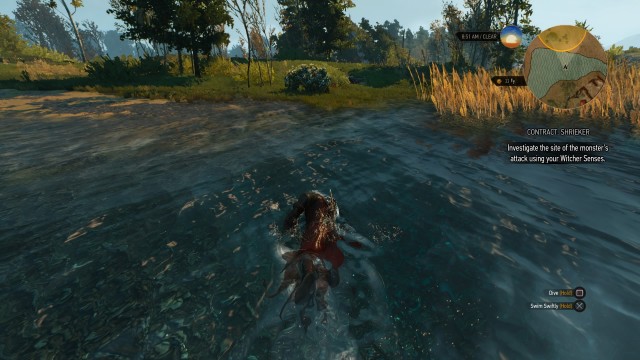
Care for a game of Gwent?
The Witcher 3 features an in-depth card game called Gwent, which feels like it could be its own separate release. Once it gets its hooks in you, you’ll often find an excuse to stray from your mission in order to challenge a random merchant or blacksmith. If you’re at all into collectible card games, don’t be surprised if your quest to find new cards and improve your deck takes priority over everything else.
One of the series’ strong suits is how your choices impact the world, despite not being on a mission to save it. Despite “your choices matter” being an easy back-of-the-box bullet point for many modern RPGs, few have pulled it off the same way the Witcher games have. Choices you feel are small at first can grow in size and affect various characters, sometimes determining the outcome of specific quests before you even begin them. There is no right or wrong, instead only what feels right in the moment.
Your choice to save a character during one quest could eventually lead to the death of another, which may just completely change a future side quest for better or worse. You never know until it’s too late, making you truly weigh your options before committing to a decision which may forever impact a character, a quest or the story as a whole in a major way. It’s a prime example of a developer truly understanding player agency and demonstrating it in every possible way.
One perfect example of this involves what I assumed were two separate, ongoing quests. One quest, that I assumed was completely unrelated to his storyline, involved me going off to destroy a cursed tree spirit. The spirit convinced me to help set it free from its prison, but the option to kill it still remained. The choice seemed harmless enough at first, but a few quests later I found out the consequences of my choice influencing the fate of a character associated with the other quest, turning it from a potentially heartwarming conclusion to something much darker. I’m ultimately happy with my decision, but the idea of what could have happened still lingers in my mind.
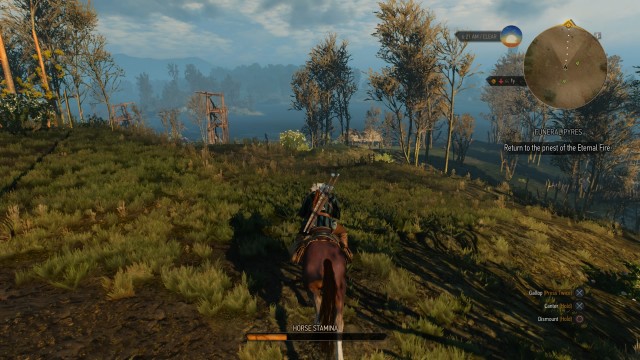
Fight, race and loot, oh my!
You may be a Witcher on an important quest, but that doesn’t mean you can’t participate in other fun activities. Want to become the fist fighting champion? Or perhaps you fancy yourself more of a horse racing fan? And don’t forget, there’s always time to go on a scavenger hunt for some lost treasure. This content is filler for sure, but it gives you an excuse to explore the world even more and test your various skills in different ways.
For the first time in the series, Wild Hunt features a full open world, complete with an enormous map to explore and a vast array of side content to keep you busy. Unlike most open-world RPGs, however, you never feel overwhelmed by the amount of content. There is plenty to keep you busy should you choose to explore and dive into the non-story content, but simply exploring the areas available to you and stumbling into assorted events is also a way to approach this massive world. I always felt like I was finding the right balance between aimless exploration and following a specific path, both of which are equally as rewarding.
It helps that many of the side quests are meaningful in some way. While some are relatively simple, such as an easy quest to track down an old woman’s frying pan or the various “stop the miscreants from ganging up on the innocent” encounters, they all throw you into situations with compelling (albeit odd, at times) characters. Best of all, that elf you saved from a random street gang might show up later on in a way you would never expect. I found myself excited to see what random quests would pop up next simply because I knew it would lead to another exciting, if not brief, adventure with unexpected results.
My favorite quests, however, were the contracts. As a Witcher, you’ll find a large variety of people willing to pay to help you eliminate a monstrous threat, from well-dwelling wraiths to blood-thirsty werewolves. These quests not only tell their own well-written side stories, they offer even more background on the various types of creatures that inhabit the world.
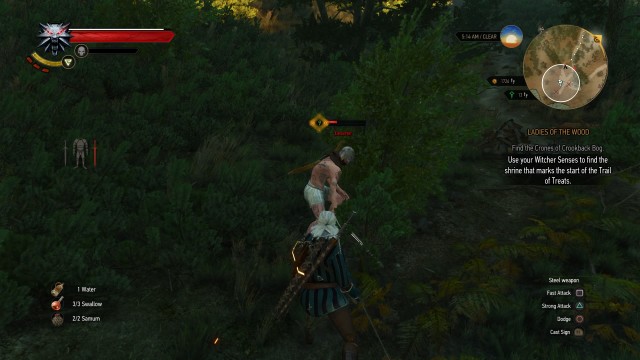
The potential of crafting
Throughout your journey, you’ll find yourself picking up a ton of additional crafting parts and alchemy ingredients. These items may seem needless and excessive at first, but as you progress through the game, you’ll come across a number of diagrams and recipes which, with the right items, will add invaluable items to your inventory and make all of the time you spent picking flowers and looting abandoned houses worth it. Don’t dismiss it as just another crafting system, because you never know what new armor set or potion you might be missing.
I can’t talk about these specific quests without discussing the combat. Like in The Witcher 2, the action-focused combat is relatively easy to wrap your head around, but there is a lot of depth for those who wish to explore it to its full potential. The basics will feel familiar to anyone who has played an action-RPG before, thanks to the combat basics being relatively simple and very responsive. What separates The Witcher from other RPGs is how combat is handled against different enemy types, and how learning each enemy’s weakness beforehand is important, especially with larger encounters (such as the Witcher contracts).
For example, a wraith will require you to rely on specific spells to even deal damage, while a flying enemy, such a griffon, will require long-range attacks from your crossbow to bring it down and some harder-hitting spells to lower its health. Knowing the particulars of each enemy is important, so this is where your bestiary comes in handy. Not only will it tell you which spells are best to use against specific enemy types, but also other ways to damage enemies, such as crafting bombs or coating your sword with oils before a fight.
You might roll your eyes and think, “I don’t want to have to study to take on these enemies.” Sure, it has the potential to be tedious, but it’s a simple process and tells you everything you need to know to effectively handle every enemy in the game. It’s not a system you need to adhere to, but taking down a giant beast through a combination of swift attacks and careful preparation is not only incredibly satisfying, it makes me eager to test my Witcher skills and take on even larger enemies. Combat becomes less of a necessary chore and more of an exciting test of your knowledge and skill, one which becomes increasingly more strenuous (and rewarding) the higher you crank the difficulty.
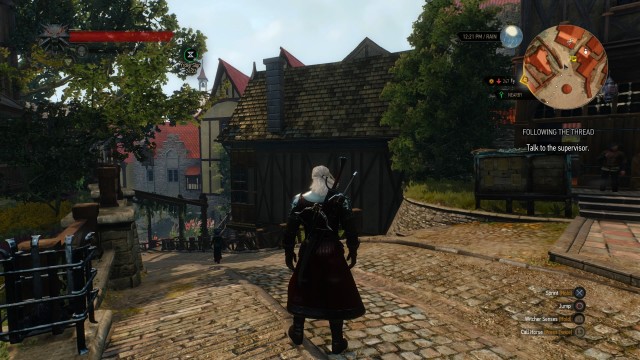
The world of The Witcher 3 might be dark and unforgiving, but that doesn’t make it any less beautiful. Whether you play the game on consoles or PC, you’re in for one stunningly gorgeous adventure. The wonderful presentation comes complete with a brilliant score which sits right next to the best you’ll hear from any RPG and fits the game’s style perfectly.
Unfortunately, the console version of the game does suffer from a few annoying issues which took me out of the experience many times. The loading times are ridiculously long and I found myself running into loading in the middle of dialogue, stopping a chat dead in its tracks while it loaded the next line. Also, the game will occasionally not allow you to interact with specific characters, making you wait more than 20 seconds before the giant prompt above their heads appears, signifying you can initiate a conversation. These technical issues are frustrating, despite how minor they are in the grand scheme of things.
Fantasy comes in many forms these days, but you’ll be hard-pressed to find it as well-realized as The Witcher 3. It takes a beaten-down world full of broken people and turns it into a remarkable place to explore, one you’ll feel right at home in despite the often grim circumstances. Thanks to its excellent approach to narrative, world-building, player agency, exploration and strategic combat, The Witcher 3 is a triumphant example of how to create an expansive open-world title which is both massive in terms of content and still completely approachable. It’s an adventure you’re bound to remember for many years to come.
Pros: Fantastic world, excellent writing and characters, meaningful player agency, exciting strategic combat, brilliant side content
Cons: Some technical issues



















